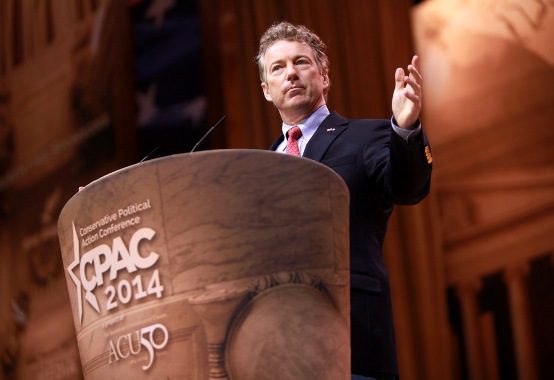At CPAC, Rand Paul Stands Ascendant

This year’s Conservative Political Action Conference has had something of a deflated feeling floating about it. The crowds are smaller, the panels are fewer, and the entire enterprise has a sneaking feeling of being scrimped on. For Rand Paul, however, CPAC was bigger and better than ever.
At last year’s conference, Paul was freshly coming off of his launch into the full national spotlight thanks to a filibuster of John Brennan’s nomination to the CIA in protest of Justice Department equivocating on executive domestic droning authority. Yet for all the positive attention he received from that filibuster, Paul was still treading softly on the Republican political ground. Libertarian politics had not been overly welcome in the wider GOP, especially after a decade of Bush II foreign policy. So he took to the 2013 stage with a rock star’s reception, complete with Metallica’s “Enter Sandman,” but deployed a sophisticated rhetorical strategy intended to make libertarianism more comfortable for conservative ears.
What a difference a year makes.
When Paul arrived behind the podium Friday night, he walked and talked with the assurance of a man confident in his base of support, and spoke more to rally the faithful than sell the skeptical. From the beginning, Paul centered his remarks around liberty, telling the audience he was not calling for more Republicans, but more “friends of liberty.” And where last year’s speech was essentially grounded, a friendly pitch to make common cause, Paul deployed much loftier rhetoric, interspersing (as he often has) quotations and references to classic thinkers like Madison and Montesquieu in his rousing call to arms. The running theme was the “great battle” coming, and an urging to not be “lemmings” rushing towards destruction, but rather men who would defend their inalienable rights.
Paul castigated a progressive majoritarianism run amok, whose free-floating definition of legitimacy puts all minorities at risk, whether the racial minorities persecuted in generations past, or minorities of ideas at risk in the present day. He made frequent reference to his fight against the security state’s overreaches, and insisted upon the imperative importance of specific warrants and open, free trials instead of general warrants and secret determinations of guilt.
Finally, Paul closed on a muscular message rejecting the gradualist’s insistence on a hesitant program of changes, telling the CPAC crowd that their job is not to minimize liberty lost, but to maximize liberty.
Paul packed in the biggest crowds of the conference by far, and walked off to the adoring cries of his supporters, who then launched him once again to the top of CPAC’s straw poll, as he pulled in 31 percent of the vote. With the enthusiasm of Ron Paul’s supporters rallying behind a son of considerably more political savvy and talent, Rand Paul has more enthusiasm and organization than any other potential 2016 contender could hope to claim. It seems without question that Rand will be able to marshal more support than Ron.
It remains to be seen whether Paul will be able to ride a tide of libertarian enthusiasm all the way through the primary process on a platform of maximizing liberty, or whether Republicans will demand he make painful, perhaps too painful, concessions to the various constituencies of American conservatism.
Comments